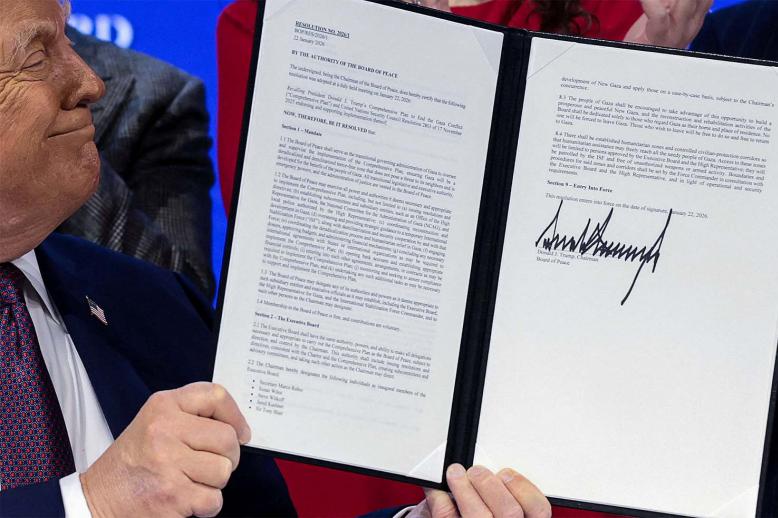Lebanon’s next government is doomed to fail
One month has passed since Hassan Diab was designated by 69 members of parliament to form the next Lebanese government.
Diab is a former minister of education and an engineering professor at the American University of Beirut. His tasks at the head of the cabinet are not short of herculean. He must handle many impossible feats, starting with a full-fledged political crisis, a shattered economy and a nationwide revolt asking for real and lasting political change.
Since his designation as prime minister, Diab has asked the public for time to put together a roster of capable and seemingly independent technocrats who can carry out much-needed reforms to salvage Lebanon and return it to normalcy, whatever that might mean.
Diab, however, is running out of time. He has been unable to form a government that could muster the required votes in parliament and, more important, to appease and win the trust of the people on the streets.
He has insisted that his designation by the pro-Iran faction does not mean he would do its bidding but, rather, that he is free to choose the members of his cabinet. Initial drafts of his lineup indicated otherwise.
The public perception is that Diab is mostly indebted to Gebran Bassil, the head of the Free Patriotic Movement, Hezbollah’s main Christian ally, and the son-in-law of Lebanese President Michael Aoun.
While Bassil has been forced to sit out the next cabinet, mainly because of the public’s insistence of a non-partisan and transparent government, this did not prevent him from trying to hijack Diab’s government by proposing people who seemingly have the necessary technical credentials but ultimately report to Bassil.
Bassil did not carry out that process subtly but made sure to leave his fingerprints to clearly indicate he was the true powerbroker and that Diab was only window dressing.
Perhaps more indicative of the deep political crisis is the shameful manner in which the political elite deal with Diab and the process. Despite publicly decelerating their willingness to expedite and facilitate the process, the ruling establishment never misses a chance to use its sectarian power base to veto a cabinet and remind the public of its aversion to surrendering even a morsel of power.
Diab, as well as the people behind him, act as if the crisis is one of inadequate or absent economic planning and that a few reforms are sufficient to invite the international community to inject money into Lebanon’s ailing economy.
Even before the ink dried on Diab’s decree, the international media branded him a Hezbollah-backed prime minister, making his task to rally the support of the international community next to none.
Soberly, Jan Kubis, the UN special coordinator for Lebanon, posted on Twitter: “Another day of confusion around the formation of a government, amid the increasingly angry protests and free-falling economy. Politicians, don’t blame the people, blame yourselves for this dangerous chaos.”
The riots in Beirut and the resurgence of the revolution led the ruling establishment to try to use the events to push through the cabinet formation and to claim that the only way to stop the violence, as well as the economic collapse, was to endorse Diab’s feeble proposed government.
The proposed government lineup indicates that Diab’s government is a Trojan horse for both Hezbollah and Bassil, each with their own intended goals.
Surprisingly, Hezbollah and parliament Speaker Nabih Berri prefer that former Lebanese Prime Minister Saad Hariri form the next government. They would not mind if Diab steps down or perhaps be forced by the street to resign.
The reality remains that Hariri is the only figure capable of giving Hezbollah enough international protection for the militant movement to operate or so they think.
Bassil, on the other hand, wants to personally return to government and ensure that he is the only contender for the presidency when his father-in-law’s term expires.
Diab might perhaps go to parliament to test whether his cabinet can win a vote of confidence. If it fails, it will replace Hariri’s as the caretaker government and force Hariri to concede to the terms of Hezbollah and its allies.
Regardless of the failure or success of the formation process, the Diab affair is proof that the political elite and all of Lebanon are a sinking ship and, instead of steering this ship to port and conducting essential repairs, the ruling clique is using a thimble to bail out the water, confirming its ineptitude and wickedness.
Makram Rabah is a lecturer at the American University of Beirut, department of history. His forthcoming book, “Conflict on Mount Lebanon: The Druze, the Maronites and Collective Memory,” (Edinburgh University Press) covers collective identities and the Lebanese Civil War.
This article was originally published in The Arab Weekly.







